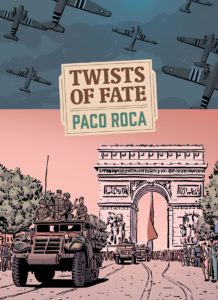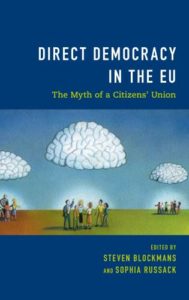
 Twists of Fate
Twists of Fate
By Paco Roca, translated from the Spanish by Erica Mena
Publisher: Fantagraphics Books
Recommended by Louie Dean Valencia-García
Spanish graphic novelist Paco Roca’s Twists of Fate (a title which references the great Spanish poet Antonio Machado who died while in exile at the end of the Spanish Civil War) not only pays close attention to historical detail, as noted by historian Robert S. Coale in the epilogue to the book, but it also situates itself among the best of a genre that blends sequential art, journalism, and oral history. Roca’s work is based on extensive research using secondary sources, newspapers, memoirs, and interviews with anarchist Miguel Ruiz (aka Miguel Campos) who served in “La Nueve.” La Nueve is a company of Spanish Civil War soldiers who traveled from the battlefields of Spain to a work camp in North Africa to a training camp in the United Kingdom to the scene of the Liberation of Paris. Ruiz, who had been assumed dead after the war, was born in the Canary Islands, but eventually re-settled in France. The story told here is neither typical of what one might expect of a history of the Spanish Civil War or of the Second World War, benefitting greatly from Roca’s talents depicting characters in the twilight of their lives, seen in his critically acclaimed graphic novel, Wrinkles.
Twists of Fate, Erica Mena’s English-language translation of Paco Roca’s Surcos del Azar, is a most welcomed addition to other historical genre comics, such as Catel Muller and José-Louis Bocquet’s Kiki de Montparnasse, Joe Sacco’s Safe Area Goražde, and, of course, Art Spiegelman’s Maus. Roca’s clean art, vivid storytelling, and historical accuracy makes the reader feel more aware of the stakes for the Spaniards who lost the Spanish Civil War as they continued their fight against fascism in the World War II. In particular, Roca’s portrayal of some of the ideological conflicts present between communists, republicans, and anarchists is both balanced and nuanced. This must-read is perfect for the undergraduate classroom, the consummate scholar, or the uninitiated. Through Roca’s Twists of Fate history is both felt and made enjoyable.
 Frères Ennemis: The French in American Literature, Americans in French Literature
Frères Ennemis: The French in American Literature, Americans in French Literature
By William Cloonan
Published by: Liverpool University Press
Recommended by Hélène B. Ducros
No need for Donald Trump’s recent acerbic tweets to know that France and the United States have had a solid history of political and cultural rivalry since their sister revolutions. And yet also an incontestable history of common ideals and shared values. Frères Ennemis joins a substantial literature that examines how the French have perceived Americans and vice-versa. The goal of this volume is to investigate Franco-American tense relations from the mid-19th century to the present through a selection of literary texts that offer an array of illustrations about how the French have written about real or imagined American characters, as well as how American writers have approached the Gallic personnage. Recognizing that these mutual paradigmatic understandings are in fact mutable over time based on historical and cultural contexts, a close reading of various fictions allows William Cloonan to suggest that French attitudes about Americans and the American experience have been more nuanced, supple, and open to change than the ways in which Americans have imagined the French.
Using Roland Barthes’ idea of “myth,” Cloonan delves into novels to explain how literary imagination has broken existing pedestrian dichotomies that have oversimplified and over-categorized the differences between the French and the Americans. Works by Henry James, Alexis de Tocqueville, Auguste Villiers de l’Isle-Adam, Edith Wharton, Ernest Hemingway, Simone de Beauvoir, Jean Echenoz, Paul Auster, Dominique Falkner and Diane Johnson lead him to reflect on an observable reversal of past paradigms (for example established clichés of sophisticated French vs. naïve Americans, or open-minded French vs. insular Americans). In analyzing this multi-faceted transformation through literature, he successfully positions writers as agents able to, if not reverse, at least challenge caricatural conceptions of the Other. Pushing our thinking beyond hasty interpretations about identity, novel characters highlight that assumptions are often formulated in response to temporary stressors. Cloonan’s book may not reconcile the French and the Americans with each other, but it clearly advances an appreciation of the ways in which story characters embody perceived ideals about their respective “national” identities. Although intentional and fittingly constructed to suit each historical moment at stake, these ideals, like Barthes’ myth, are also contingent, unbounded, volatile, incoherent, and inconsistent. They need not be discussed in terms of truth or untruth, but in terms of a contextualized and historicized mythmaking process –myth that is also shaped from the inside out, especially as Americans are grappling with Trump’s presidency and the French are taking to the streets against Macron’s reforms.
 Direct Democracy in the EU: The Myth of a Citizens’ Union
Direct Democracy in the EU: The Myth of a Citizens’ Union
Edited by Steven Blockmans and Sophia Russack
Publisher: Rowman & Littlefield International
Recommended by Mihai Sebe
The state of democracy in the European Union is a subject of constant debate. While some have argued that concern about the “democratic deficit” is misplaced, the prevailing sense is nevertheless that the EU has a democracy problem. Building on the notion of increasing social, economic and political interdependence across borders, this volume asks whether and, if so, how a sense of solidarity and European identity can be rescued from the bottom up by politically empowering citizens to “take back control” of the EU. Each chapter starts with a short summary and reader-friendly highlights of the key messages appear throughout the book. Direct Democracy in the EU: The Myth of a Citizens’ Union is part of the ”Towards a Citizens’ Union” project and is the product of collaboration with 20 renowned think tanks from the European Policy Institutes Network (EPIN). It is the first of three publications that will also cover the state of representative democracy in the EU and the accountability of democratic institutions.
Published on December 11, 2018.




